
"That'll Be the Day" is a song written by Buddy Holly and Jerry Allison. It was first recorded by Buddy Holly and the Three Tunes in 1956 and was re-recorded in 1957 by Holly and his new band, the Crickets. The 1957 recording achieved widespread success. Holly's producer, Norman Petty, was credited as a co-writer, although he did not contribute to the composition.

The Hollies are an English rock and pop band formed in 1962. One of the leading British groups of the 1960s and into the mid-1970s, they are known for their distinctive three-part vocal harmony style. Allan Clarke and Graham Nash founded the band as a Merseybeat-type group in Manchester, although some of the band members came from towns further north, in east Lancashire. Nash left the group in 1968 to form Crosby, Stills & Nash, though he has reunited with the Hollies on occasion.
Showaddywaddy are a rock and roll group from Leicester, England. They specialise in revivals of hit songs from the 1950s and early 1960s, while also issuing original material. They have spent 209 weeks on the UK Singles Chart, and have had 10 Top Ten singles, one reaching number one.

"Stop! In the Name of Love" is a 1965 song recorded by the Supremes for the Motown label.

"Summertime Blues" is a song co-written and recorded by American rock artist Eddie Cochran. It was written by Cochran and his manager Jerry Capehart. Originally a single B-side, it was released in August 1958 and peaked at number 8 on the Billboard Hot 100 on September 29, 1958, and number 18 on the UK Singles Chart. It has been covered by many artists, including being a number-one hit for country music artist Alan Jackson, and scoring notable hits in versions by Blue Cheer, the Who and Brian Setzer, the last of whom recorded his version for the 1987 film La Bamba, in which he portrayed Cochran. Olivia Newton-John recorded this song for her Clearly Love album in 1975.

"Buddy Holly" is a song by the American rock band Weezer. The song was written by Rivers Cuomo and released by DGC as the second single from the band's debut album, Weezer (1994). The lyrics reference the song's namesake, 1950s rock-and-roll singer Buddy Holly, and actress Mary Tyler Moore. Released on September 7, 1994—which would have been Holly's 58th birthday—the song reached number two on the US Billboard Modern Rock Tracks chart and number 18 on the Billboard Hot 100 Airplay chart. Outside the US, the song peaked at number six in Canada, number 12 in the United Kingdom, number 13 in Iceland, and number 14 in Sweden. The song's music video, directed by Spike Jonze, earned considerable exposure when it was included as a bonus media file in Microsoft's initial successful release of the operating system, Windows 95.
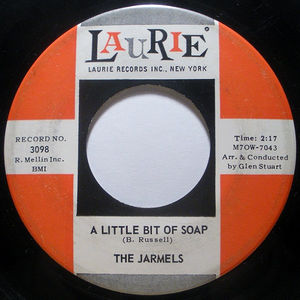
"A Little Bit of Soap", written by Bert Berns, was a song, first sung in a bluesy soul style by the Jarmels, who reached number 12 with it in September 1961 and number 7 on the R&B charts. The song has been covered by many other artists.

"He Ain't Heavy, He's My Brother" is a ballad written by Bobby Scott and Bob Russell. Originally recorded by Kelly Gordon in 1969, the song became a worldwide hit for the Hollies later that year and also a hit for Neil Diamond in 1970. It has been recorded by many artists in subsequent years. The Hollies' version was re-released in 1988 and again was a major hit in the UK.

"Shop Around" is a song originally recorded by the Miracles on Motown Records' Tamla subsidiary label. It was written by Miracles lead singer Smokey Robinson and Motown Records founder Berry Gordy. It became a smash hit in 1960 when originally recorded by the Miracles, reaching number one on the Billboard R&B chart, number one on the Cashbox Top 100 Pop Chart, and number two on the Billboard Hot 100 chart. It was the Miracles' first million-selling hit record, and the first-million-selling hit for the Motown Record Corporation.

"Tragedy" is a song released by the Bee Gees, written by Barry, Robin & Maurice Gibb, included on their 1979 album Spirits Having Flown. The single reached number one in the UK in February 1979 and repeated the feat the following month on the US Billboard Hot 100. In 1998, it was covered by British pop group Steps, whose version also reached number one in the UK.
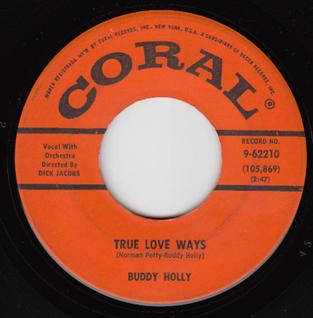
"True Love Ways" is a song attributed to Norman Petty and Buddy Holly. Buddy Holly's original was recorded with the Dick Jacobs Orchestra in October 1958, four months before the singer's death. It was first released on the posthumous album The Buddy Holly Story, Vol. 2, in March 1960. The song was first released as a single in Britain in May 1960, reaching number 25 on the UK Singles Chart. It was released the following month in the US, but did not make the charts. In 1988, a UK re-release of the recording by MCA, the single reached no. 65 on the UK singles chart in a 5 week chart run.
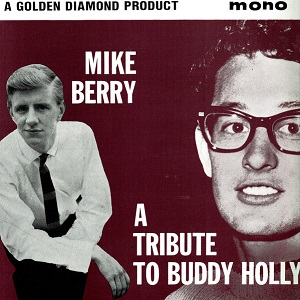
"Tribute to Buddy Holly" is a song written by Geoff Goddard, first recorded by Mike Berry and the Outlaws as a single, which was released in September 1961 on His Master's Voice records. His first chart success, it reached number 24 on the UK Singles Chart in November 1961. The song was banned by the BBC for being too "morbid", regarding the death of 1950s rock and roll singer Buddy Holly, who died in a plane crash on 3 February 1959.

"Everyday" is a song written by Buddy Holly and Norman Petty, recorded by Buddy Holly and the Crickets on May 29, 1957, and released on September 20, 1957, as the B-side of "Peggy Sue". The single went to number three on the Billboard Hot 100 chart in 1957. "Everyday" is ranked number 238 on Rolling Stone magazine's list of the "500 Greatest Songs of All Time".

The Buddy Holly Story is the first posthumously released compilation album by Buddy Holly and the Crickets. The album was released on February 28, 1959 by Coral Records less than a month after Holly's death.
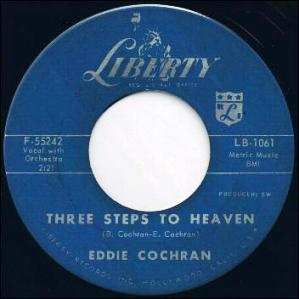
"Three Steps to Heaven" is a song co-written and recorded by Eddie Cochran, released in 1960. The record topped the charts in the Republic of Ireland and the United Kingdom posthumously for Cochran following his death in a car accident in April 1960. In the US it did not reach the Billboard Hot 100.
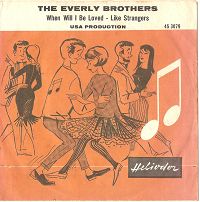
"When Will I Be Loved" is a popular song written by Phil Everly of the Everly Brothers, who had a US top-ten hit with it in 1960. Linda Ronstadt covered the song in 1975, and her version was an even bigger hit in the US, peaking at No. 2. Vince Gill also covered it in 1994 on the soundtrack of the film 8 Seconds.

"Raining in My Heart" is a song recorded by Buddy Holly on October 21, 1958 at the Pythian Temple on West 70th Street in New York City, with the orchestral backing by Dick Jacobs. The music and lyrics are written by the songwriting team of Felice Bryant and Boudleaux Bryant. It was released as a single on Coral Records in 1959, peaking at number 88 on the Billboard chart as the B-side of "It Doesn't Matter Anymore". This recording was included on Buddy Holly's first "greatest hits" compilation album, The Buddy Holly Story, that was released in March 1959.
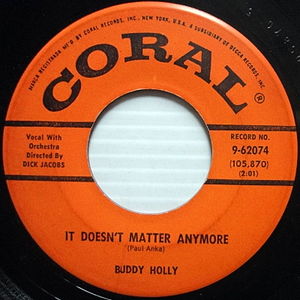
"It Doesn't Matter Anymore" is a pop ballad written by Paul Anka and recorded by Buddy Holly in 1958. The song was issued in January 1959, less than a month before Holly's death. "It Doesn't Matter Anymore" reached number 13 as a posthumous hit on the Billboard Hot 100 chart in early 1959, shortly after Holly was killed in a plane crash on February 3, 1959. The single was a two-sided hit, backed with "Raining in My Heart". "It Doesn't Matter Anymore" was Holly's last US Top 20 hit and featured the orchestral backing of Dick Jacobs. It was also successful in the United Kingdom, where it became the country's first posthumous number 1 hit.

"It's So Easy!" is a rock-and-roll song written by Buddy Holly and Norman Petty. It was originally released as a single in 1958 by the Crickets but failed to chart. It was the final release by the Crickets when Holly was still in the band.
"Farmer John" is a song written by Don "Sugarcane" Harris and Dewey Terry, and first recorded by the two as the American R&B duo Don and Dewey, in 1959. Although the original version of the composition did not receive much attention, it was reinvigorated by the garage rock band the Premiers, whose raving remake of the song was released in 1964. The song's raw and partying atmosphere was immensely popular, reaching number 19 on the Billboard Hot 100. Following the group's national success, several additional interpretations of "Farmer John" were released, making the tune a classic of garage rock.


















